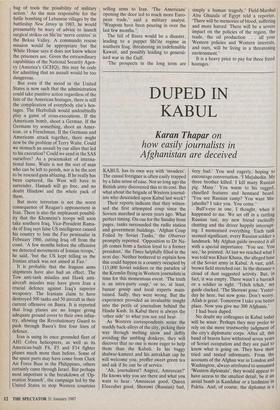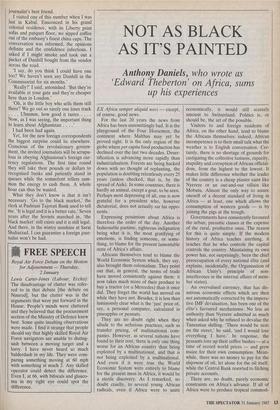DUPED IN KABUL
Karan Thapar on
how easily journalists in Afghanistan are deceived
KABUL has its own way with 'invaders'. The casual foreigner is often easily trapped by a false sense of ease. Not so long ago the British army discovered this to its cost. But what about the brigade of Western journal- ists who descended upon Kabul last week?
Their reports indicate that they witnes- sed the first attempted coup since the Soviets marched in seven years ago. What perfect timing. On cue for the Sunday front pages, tanks surrounded the radio station and government buildings. 'Afghan Coup Foiled by Soviet Tanks,' the Observer promptly reported. 'Opposition to Dr Na- jib comes from a faction loyal to a former president,' the Times helpfully filled in the next day. Neither bothered to explain how this could happen in a country occupied by 115,000 Soviet soldiers or the paradox of the Kremlin flying in Western journalists in time for this momentous event. 'The truth is an intra-party coup,' or so, at least, bazaar gossip and local experts main- tained. Sadly, they were wrong. But the experience provided an invaluable insight into the perils of journalism behind the Hindu Kush. In Kabul there is always the `other side' to what you see and hear.
As Western correspondents scour the muddy back-alleys of the city, picking their way through melting snow and deftly avoiding the ambling donkeys, they will discover that no one is more eager to help them than the Kabuli. In his baggy shalwar-kameez and his astrakhan cap he will welcome you, proffer sweet green tea and ask if he can be of service.
`Ah, journaleest? Angrez, Amreecan?' He knows why you are there and what you want to hear. `Amreecan good, Queen Eleezabet good, Shoruwi (Russian) bad, ery bad.' You nod eagerly, hoping to encourage conversation. 'I Mujahedin. My three brother killed. I kill many Russian pig. Many.' You warm to his rugged, chiselled features and hennaed beard. `You see Russian camp? You want Mu- jahedin? I take you. You come.'
Bull's-eye in one, I thought, when it happened to me. We set off in a rattling Russian taxi, my new friend excitedly chatting and the driver happily interrupt- ing. I memorised everything. Each tank seemed significant, every Russian soldier a landmark. My Afghan guide invested it all with a special importance. 'You see. You see,' he pointed. At last we reached what I was told was Khair Khana, the alleged base of the Soviet army in Kabul. A vast, arid, brown field stretched out. In the distance a cloud of dust suggested activity. But, in fact, it was empty. There wasn't a barrack or a soldier in sight. `Tchch tchch,' my guide clucked. 'The Shoruwi gone. Yester- day he here, but now gone. Don't worry. Allah is great. Tomorrow I take you better place. Now you give me 300 Afghanis.'
I had been duped.
No doubt my colleagues in Kabul today will be wiser. Perhaps they may prefer to rely on the more trustworthy judgment of the city's diplomatic corps. After all, this band of braves have withstood seven years of Soviet occupation and they are paid to know what is going on. They have their tried and tested informants. From the accounts of the Afghan war in London and Washington, always attributed to unnamed `Western diplomats', they would appear to have access to the smallest detail, be it an aerial bomb in Kandahar or a landmine in Paktia. And, of course, the diplomat is a journalist's best friend.
I visited one of this number when I was last in Kabul. Ensconced in his grand colonial residence, with its Liberty print sofas and parquet floor, we sipped coffee out of the embassy's finest china cups. The conversation was informed, the opinions definite and the confidence infectious. I asked if I might smoke and took out a packet of Dunhill bought from the vendor across the road.
`I say, do you think I could have one too? We haven't seen any Dunhill in the Commissariat for six months.'
'Really?' I said, astonished. 'But they're available at your gate and they're cheaper here than in London.'
`Oh, is the little boy who sells them still there? We go out so rarely one loses track . . Uhmmm, how good it tastes . . . . Now, as I was saying, the important thing to learn about Afghanistan . . .
I had been had again.
Yet, for the new foreign correspondents the biggest surprise could lie elsewhere. Conscious of the revolutionary govern- ment, the invited journalists will be scrupu- lous in obeying Afghanistan's foreign cur- rency regulations. The first time round they will take their pounds or dollars to recognised banks and patiently stand in queues while the somnolent tellers sum- mon the energy to cash them. A whole hour can thus be wasted.
What they don't know is that it isn't necessary. `Go to the black market,' the clerk at Pashtuni Tajorati Bank used to tell me. 'It is legal and it is a better rate.' Seven years after the Soviets marched in, 'the black market' still exists and it is still legal. And there, in the wintry sunshine at Sarai Shaharzad, I can guarantee a foreign jour- nalist won't be had.




































 Previous page
Previous page